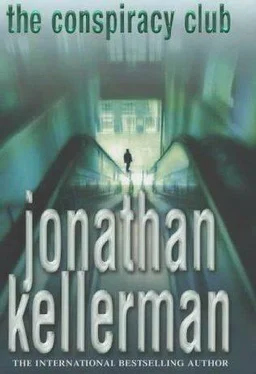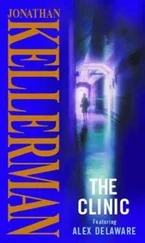“What side?”
“Driven, obsessive. My father always kidded me about it. ‘Where’s the race, Princess?’ ” She shot Jeremy a wan smile. “Intellectually, I know he’s right, but the thing is I do feel there’s a race. Against time- against the time when your mind and body slow down and grind to a halt and you end up six feet under. Morbid, huh?”
“Maybe it’s too many hours on the wards,” said Jeremy.
“No, I’ve always been this way. If the assignment was to write a five-page bio paper, I handed in seven. When the gym teacher said ten girl push-ups, I did boy push-ups and struggled for twenty. I’m sure part of it’s OCD. When I was eight, I went through a ritual phase- checking my bedroom for an hour before I’d go to sleep. Lining up my shoes. No one knew. I’d let my mother put me to bed, sneak out, go through the entire rigamarole. If something interrupted me, I started from scratch.”
“How’d you stop?”
“I told myself it was stupid and lay shaking under my covers until the urge passed. For months I got the urge, but I stuck to my guns. When I was twelve I developed an ulcer. The doctor- and my parents- insisted it was a bacterial infection. They treated me with antibiotics and I got better. But still… now you know my whole sordid past. Any analysis, Doctor?”
He shook his head.
“Really,” she insisted. “What do you think?”
“Have you ever lost anyone close to you?”
“My grandma,” she said. “I was six and she was old and ill, but we were close… it shocked me. The fact that I’d never see her again.”
Jeremy nodded.
She said, “So what you’re saying is that loss was so profound that it traumatized me about death? The essence- the permanence? And now I need to race through life like a headless chicken, piling up experiences?”
“I was thinking more of an untimely death. Someone struck down prematurely. But sure. If your grandmother’s passing was a shock, it could influence you that way. Traumatic loss does that. The gone -ness of it all.”
“The gone-ness.” She shook her head, smiling. “You and words. How’s your writing, by the way?”
“Torturous.”
“It’ll work out.” Angela’s eyes grew distant. “Maybe you’re right. I don’t know.” She looked away, lowered her voice. “Premature death. You’ve been through that.”
“What do you mean?” said Jeremy, louder than he’d intended.
“You know.”
Jeremy stared at her. Knew he was glaring but couldn’t stop.
He said, “Let’s change the subject.”
Her face drained of color. “Sure, I’m sorry, forget I mentioned it.”
“Don’t worry about it,” he said, but his heart was pounding, and he needed to get out of there.
As close as we’ve become, there are places she can’t go. Some things I will not share.
“Jeremy?”
“Yes.”
“I’m sorry.”
“Nothing to be sorry about.”
“I’ve got to go,” she said. “I’m not sure when I’m going to have free time.”
“Are you on tonight?”
“No, but I need to hit the sack early. I’m still feeling kind of run-down- maybe the flu hasn’t left my system.”
“Want me to walk you up to the ward?”
“No, it’s okay.”
“Take care of yourself.”
“You, too.”
The following afternoon, she called to tell him she’d been tied up in surgery, planned to observe more.
Ted Dirgrove had “performed” a quintuple bypass. The verb made Jeremy think of a stage and a baton.
“Interesting,” he said.
“Amazing. It’s something to see.”
“And the patient survived.”
“What do you mean?”
“The only patient Dirgrove and I have in common didn’t.”
“Oh.” She sounded deflated. “Yes, that was bad… I guess I’d better be going- did I ever thank you for babying me through my flu?”
“More than once.”
“I wasn’t sure if I did. Since I got back on service, things got so hectic so quickly, and I know we haven’t- anyway, thanks again. For the soup and everything else. That was beyond the call of duty.”
Her gratitude sounded formalized. Putting space between them.
Who was he kidding? He’d done that. The conversation-killing glower, when all she’d done was ask about…
“Still feeling run-down?” he said.
“A little, but better.”
“So the bypass was amazing.”
“Really, Jer. The human heart, this little thing, like a big plum- like a skinless tomato. What a gorgeous thing, the way the chambers and valves work in concert. It’s… philharmonic. While the arteries are being spliced in, they keep the heart pumping artificially and… it’s… I keep thinking in orchestral terms, that perfect balance, the tempo- uh-oh, I just got another page, have to go.”
The third postcard was from Damascus, Syria. A picture of the ancient Casbah- a shiny shot of jumbled stalls and their proprietors. White-robed men peddling brassware and carpets and dried nuts.
Postmarked Berlin.
Aha!
Aha, what ?
All Jeremy could come up with was that Arthur’s wanderlust had its limits. The old man was unwilling to forgo the creature comforts of the Western World for a Levantine jaunt.
But he wanted Jeremy to think Levantine.
Damascus… Jeremy knew Syria was a brutal dictatorship, but, beyond that, the country and its ancient capital meant nothing to him.
Oslo, Paris, Damascus… Oslo, Paris, Berlin , Damascus? If this was a game, he wasn’t even on the playing field.
He stuck the postcard in the Curiosity file. Had a second thought and pulled out the file and reviewed its contents and ended up with a crushing headache.
He popped aspirin, took the risk of drinking his own lousy coffee.
By the end of the day, alone, with no chance of seeing Angela, with the prospect of his dark, cold house in his immediate future, he found himself hoping for another Otolaryngology envelope. Anything to clear the haze. He stopped by the Psychiatry Office to make sure no new mail had come through.
The office was closed.
Nothing arrived in either of the next day’s deliveries. Same for the day after that.
Suddenly, life was too quiet.
The weekend rolled around. Angela was back on call and Jeremy endured a solitary Saturday, doing crosswords, pretending to be interested in sports, smiling at Mrs. Bekanescu when she stuck her head out to sweep her front porch. Receiving an ugly look in return.
What had Doresh told her?
He read the entire Sunday paper, wondering if any details about the nameless woman on the Finger would surface. They didn’t. By Sunday evening he was ready to climb the walls.
His beeper had been silent all weekend. He phoned the page operator and asked if any calls had come through.
“No, Doctor, you’re all clear.”
He drove to the hospital anyway, attacked his book introduction, was astonished to find the words flowing. He finished the damn thing by 10 P.M., reread it, made a few changes, and packaged it to send to the Head of Oncology for review.
Now what?
Not long ago he’d have cherished the solitude. Now, he felt incomplete.
He logged on to the computer, returned to the Clarion archive, activated his account and entered Norbert Levy’s name as a search-word. Not limited, this time, by “homicide.”
Zero.
The same went for “Edgar Marquis” and, not surprisingly, the pseudonym-protected “Harrison Maynard.”
Tina Balleron had mentioned a couple of Maynard’s aliases. “Amanda… Fontaine,” “Barbara Kingsman.”
Nothing under either nom de plume .
He gave up, turned the computer off, drove to the Excelsior Hotel, made a beeline for the bar. Empty bar, he had his pick of booths and chose the same one where he and Arthur had drunk and talked and nibbled on hors d’oeuvres.
Читать дальше












